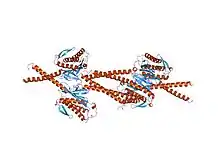HORMA domain
In molecular biology, the HORMA domain (named after the Hop1p, Rev7p and MAD2 proteins) is a protein domain that has been suggested to recognise chromatin states resulting from DNA adducts, double stranded breaks or non-attachment to the spindle and act as an adaptor that recruits other proteins. Hop1 is a meiosis-specific protein, Rev7 is required for DNA damage induced mutagenesis, and MAD2 is a spindle checkpoint protein which prevents progression of the cell cycle upon detection of a defect in mitotic spindle integrity.[1][2]
| HORMA domain | |||||||||
|---|---|---|---|---|---|---|---|---|---|
 crystal structure of mad1-mad2 reveals a conserved mad2 binding motif in mad1 and cdc20. | |||||||||
| Identifiers | |||||||||
| Symbol | HORMA | ||||||||
| Pfam | PF02301 | ||||||||
| InterPro | IPR003511 | ||||||||
| SCOP2 | 1duj / SCOPe / SUPFAM | ||||||||
| |||||||||
References
- He X, Patterson TE, Sazer S (1997). "The Schizosaccharomyces pombe spindle checkpoint protein mad2p blocks anaphase and genetically interacts with the anaphase-promoting complex". Proc Natl Acad Sci U S A. 94 (15): 7965–70. Bibcode:1997PNAS...94.7965H. doi:10.1073/pnas.94.15.7965. PMC 21538. PMID 9223296.
- Aravind L, Koonin EV (1998). "The HORMA domain: a common structural denominator in mitotic checkpoints, chromosome synapsis and DNA repair". Trends Biochem Sci. 23 (8): 284–6. doi:10.1016/S0968-0004(98)01257-2. PMID 9757827.
External links
- Eukaryotic Linear Motif resource motif class LIG_MAD2
This article is issued from Wikipedia. The text is licensed under Creative Commons - Attribution - Sharealike. Additional terms may apply for the media files.